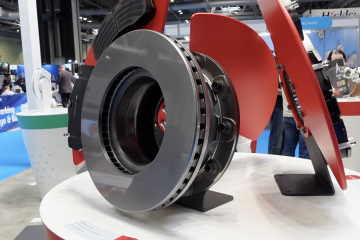UK registrations figures are proving less stable than last year, with the new-car market suffered another decline in October.
Having started the year strongly, the second quarter of 2024 saw improvements limited to small figures, while a run of growth ended in August, after two years. Despite a bounce back in September, the latest figures from the SMMT show registrations declined 6% last month. This is the worst drop since July 2022, when the market was in the midst of a supply-chain crisis.
The new-car market across Europe is struggling at present, with different factors affecting different regions. However, the UK is perhaps one of the better-placed areas, having not relied on EV incentives for growth, and with no tariffs on imports of Chinese-built battery-electric vehicles (BEVs). Yet concerns over higher business rates and a continuing cost-of-living crisis seem to have stifled interest in vehicle purchases.
The latest UK registrations data shows a total of 144,288 units took to roads in October, with the market driven by BEVs. This is 9,241 passenger cars lower than the same point last year. In the first 10 months of this year, the market is 3.3% up, with around 1.7 million units delivered.
Fleets fail in UK registrations
For the second time this year, fleet UK registrations declined, with figures in October down 1.7% compared to last year.
As the fleet sector holds more importance for the aftermarket in UK registrations figures, this decline is of interest. Yet the decline is minimal, and with 86,701 units making up 60.1% of deliveries, it is only a drop of 1,487 compared with October 2023. So far this year, the fleet sector is up 14.4%, with 979,056 registrations.
This means in three-years’ time, these vehicles are likely to enter the independent service and repair sector, with fleets expected to renew their parcs prior to their first MOT.
Private UK registrations fell by 11.8%, continuing a two-year trend of declines, while the low-volume business market dropped 12.8% in the month.
Unpopular petrol
October’s fall in UK registrations was driven by the decline in petrol deliveries. A total of 72,681 units were driven away from showrooms, 14.2% fewer than the same month last year.
The SMMT includes mild hybrids in with their respective petrol and diesel counterparts. Therefore, the petrol decline is perhaps worse than reported. Where the fuel type holds a 50.4% share of the new-car market in October, this is above average for other European markets, where the share hovers around 32%.
Petrol has struggled in the UK registrations during 2024. The fuel was down by 1.8% across the first 10 months of the year. Again, other markets have worse figures, highlighting the impact of mild hybrids in these numbers. Carmakers are increasingly turning to the technology, as well as full hybrids, in an effort to improve their CO2 emissions.
This is likely to continue in 2025, with petrol sales restricted, as new EU guidelines come into play. While the UK is not subject to the latest emissions targets, manufacturers will create a model and powertrain line-up for the entire continent, rather than specific plans for specific markets.
Diesel’s decline continued, with just 8,961 units delivered in the month, a drop of 20.5%. This is again due to fewer carmakers offering the engine in their line ups, together with continued demonisation of the technology.
BEVS hold up
BEVs had a strong month, and prevented the UK registrations figures from an even bigger decline. The powertrain was up 24.5% in October, reversing a trend of slow growth, with 29,802 units delivered.
This made the drivetrain the second most popular in the UK, after petrol. Its market share in the month was 20.7%, giving hope that the overall market could reach its 22% target in the Zero-Emission Vehicle Mandate.
However, in the first 10 months of 2024, BEVs hold an 18.1% market share, below the requirement. It should be noted the 22% target is for each individual carmaker to reach, with many projected to miss out.
Plug-in hybrids saw a small decline of 3.2% in October, with 13,832 units delivered. Full hybrids also saw a small drop, with the 1.6% decline equating to a difference of just 311 units.
Challenge ahead
“Massive manufacturer investment in model choice and market support is helping make the UK the second largest EV market in Europe,” commented SMMT Chief Executive Mike Hawes. “That transition, however, must not perversely slow down the reduction of carbon emissions from road transport.
"Fleet renewal across the market remains the quickest way to decarbonise, so diminishing overall uptake is not good news for the economy, for investment or for the environment. EVs already work for many people and businesses, but to shift the entire market at the pace demanded requires significant intervention on incentives, infrastructure and regulation.”
In its release on the UK registrations figures, the SMMT highlighted that, while the Budget extended existing business and fleet incentives for BEVs, the Vehicle Excise Duty and Company Car Tax changes disincentivise low carbon vehicle purchases and fleet renewal generally, risking a delay to the overall reduction in road transport emissions.
“Moving the market rapidly towards these ambitious targets needs bold and compelling incentives for consumers,” the industry body stated. “Manufacturers are currently shoring up demand with historic levels of support, but this is unsustainable in the long term as it threatens viability. Without the government support to match the manufacturers’ commitment, there must be an urgent review of the market’s performance and the regulatory mechanisms driving the transition.”



